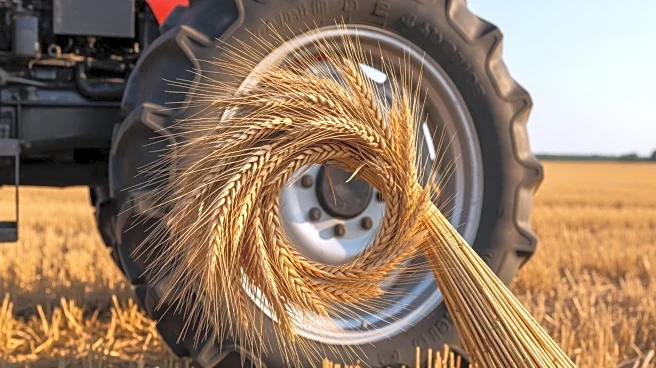What's Happening?
In Kansas, leaders from major commodity groups, including Kansas Wheat, Kansas Corn, Kansas Soybeans, and Kansas Grain Sorghum, are working together to address the challenges facing the state's agriculture sector. During a roundtable discussion at the Kansas Wheat Innovation
Center, the CEOs of these organizations discussed the importance of collaboration in maintaining the relevance of Kansas agriculture in a difficult market. They highlighted the role of farmer-funded checkoff programs in supporting research, market development, and education. These programs are crucial for developing new crop varieties and improving agricultural practices, particularly through partnerships with Kansas State University. Despite the benefits of these initiatives, Kansas farmers are currently facing significant challenges, including low commodity prices and high input costs, which are squeezing farm margins. Additionally, international trade slowdowns are impacting exports of sorghum and wheat. The CEOs emphasized the need for short-term relief measures until new farm bill provisions are implemented.
Why It's Important?
The collaboration among Kansas commodity groups is vital for the state's agricultural sector, which is a significant contributor to the local and national economy. By pooling resources and aligning priorities, these groups are better equipped to support farmers through research and market development, ensuring that Kansas remains competitive in the agricultural industry. The challenges of low commodity prices and high input costs are not unique to Kansas, but the state's approach to addressing these issues through collaboration and innovation could serve as a model for other regions. The success of these efforts has broader implications for food security and economic stability, as agriculture is a key industry in the U.S. economy. The ability of Kansas farmers to adapt and thrive in a challenging market environment is crucial for sustaining rural communities and supporting the national food supply chain.
What's Next?
As Kansas farmers navigate the current economic pressures, the focus will be on maintaining efficiency and market access while advocating for policies that reflect the realities of Kansas agriculture. The commodity groups will continue to invest in research and development to drive innovation and improve crop resilience. In the short term, there may be a need for policy interventions to provide relief to farmers until the new farm bill provisions take effect. The ongoing collaboration among Kansas commodity groups will be essential in ensuring that farmer investments yield tangible benefits, not only in terms of crop production but also in strengthening the agricultural community as a whole.
Beyond the Headlines
The situation in Kansas highlights the importance of agricultural policy and the role of research in driving long-term sustainability in farming. The state's emphasis on collaboration and innovation could lead to significant advancements in crop science and agricultural practices, potentially influencing national agricultural policy. Additionally, the challenges faced by Kansas farmers underscore the need for a comprehensive approach to agricultural support that balances market forces with necessary interventions to ensure the viability of the farming sector.
















